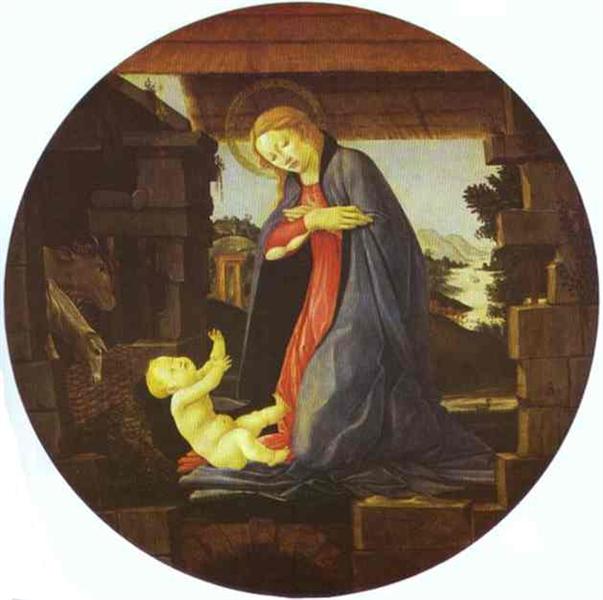Popis
Sandro Botticelli's Madonna Adoring the Child, painted in 1490, is a moving testament to the technical mastery and deep spiritual sense of the Italian Renaissance. In this painting, Botticelli captures a moment of intimate devotion between the Virgin Mary and the infant Jesus, who is placed at the center of the composition, surrounded by a halo of light that accentuates his purity and innocence. This type of depiction, which emphasizes the mother-child relationship, is common in religious art of the period, but Botticelli brings his own distinctive style that is evident in the elegance of the forms and the harmony of the colors.
The figure of the Madonna is presented in a posture of deep adoration, leaning towards the Child with an expression of serene sweetness that exudes love and devotion. Mary's garment, decorated with subtle folds and soft hues, reflects the artist's skill in capturing texture and movement. Botticelli uses a warm color palette that includes gold and terracotta hues that not only enrich the visual experience, but also invoke a sense of divinity and transcendence. The light, which seems to emanate from the infant Jesus, creates a halo effect that symbolizes his divine nature, further highlighting the sacredness of the scene.
The background of the painting is equally significant, although it lacks details that distract from the central figure. It recreates an ethereal atmosphere, using a soft landscape that shows a clear sky and some clouds, suggesting a connection between the earthly and the heavenly. This choice of background could be interpreted as an invitation to contemplate the spirituality that surrounds the figures, and allows the viewer's attention to focus on the deep relationship between mother and son.
Botticelli's work fits into the broader context of Renaissance art, a period that celebrated the humanization of religious figures, moving them from their idealized representation to a more palpable emotional connection. It is a time when there is a search not only for aesthetic beauty, but also for a more intimate and affective representation of the sacred. The work reminds us that while religious context and iconography are essential, it is the artist's ability to evoke deep feelings and personal relationships that truly resonates with the viewer.
Botticelli's technique, characterized by a delicate use of line and a focus on idealized beauty, has left an indelible mark on art history. "The Madonna Adoring the Child" ranks with the author's other masterpieces, such as "The Birth of Venus" and "Primavera," where one can also observe his skill in depicting the human body and his obsession with beauty and symmetry. In this painting, beauty is not merely superficial; it is imbued with a deep sense of love and tenderness.
Ultimately, "The Virgin Adoring the Child" is not only an example of Botticelli's artistic production, but also invites a reflection on the emotional connection that art can establish between the viewer, the subject and the artist. The work offers us a profound encounter with spirituality, a moment suspended in time where worship becomes an act of pure love, encapsulating the essence of the human experience and elevating it towards the divine.
KUADROS ©, a famous painting on your wall.
Hand-made oil painting reproductions, with the quality of professional artists and the distinctive seal of KUADROS ©.
Painting reproduction service with satisfaction guarantee. If you are not completely satisfied with the replica of your painting, we will refund 100% of your money.

